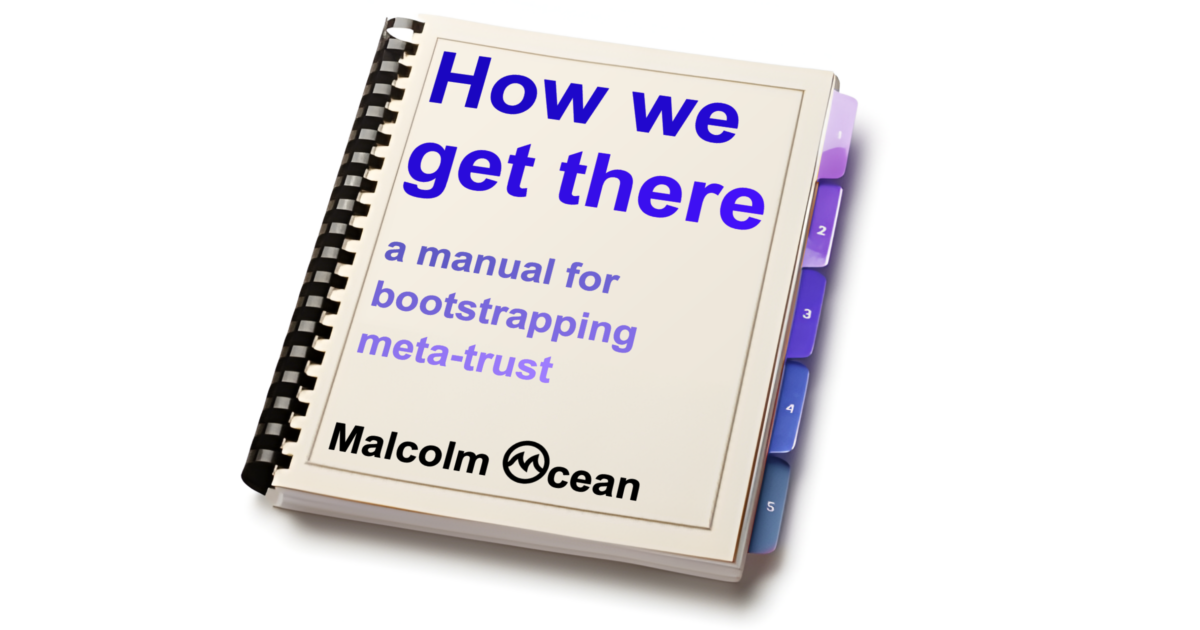A few years ago, I was sharing some of my visions (eg this one or my 100× vision) with a friend and he said “that’s cool but how do we get there?” so I went to doc.new (which, if you didn’t already know, makes a new google doc!) and typed in the title field “How we get there” and proceeded over the following weeks to pour out over 20 thousand words on the topic!
It had a very “say the obvious” feel—I was just articulating what had recently become obvious—what followed from my non-naive trust dance insight in 2020. It doesn’t actually make that many references to the phrase “trust-dancing”, but it describes the core dynamics involved in navigating the dance of trust and distrust, with a closed group of people or with a group of people that is growing. But—which may or may not be obvious to you—what’s obvious to me isn’t going to be obvious to everybody, and that’s why it’s good to say the obvious.
My original purpose was to share it with a few close collaborators, to help us get in sync (which is part of how we get there!) but I found that I was really excited about the writing and shared it with a couple dozen friends or connections I knew less well when it seemed relevant, and eventually I tossed it up on gumroad for sale as a pdf…
…and promptly told almost nobody. I made like one tweet, and this short post on the same ideas, which links to it at the bottom.
But then this week somehow someone came across it, and bought it, which prompted me to tweet about getting my first book sale, which resulted in seven nine more people buying it, multiple of whom said “I had no idea this existed! you need to talk about it more!” so I figured I would more properly announce it on my blog!
So, without further ado, here’s the link to buy the book on gumroad! Or push this button:

I expect this piece of writing to be quite useful for people who are (or want to be)
…and of general interest to:
At least one friend of mine has had a good time putting the book into an LLM and then exploring the ideas together, and I could imagine that the text might also do a decent job of informing an LLM to give you advice on some of the above things.
I’ve also been thinking about turning my “I can tell for myself” sequence into a short book and selling that. I’ve definitely sometimes found it easier to consume long-form web content when I can load it up into a reader that saves my place. It’s about the same length (20k words) and even more coherent.
20,000 words feels slightly short for a paper book, but it would be fun to be able to put a copy of either of these on my own bookshelf or the bookshelves of my friends. I also have a bunch of adjacent pieces of writing that I think would augment the ICTFM sequence, diving a bit deeper into certain topics that weren’t quite necessary for the main thread. (On which note, I have a new section on my site called “half-baked” where I post things that aren’t (yet) ready to be broadcast as a full post, and it includes some short Appendices to the ICTFM sequence).
Anyway, if you might buy such a thing, then let me know in the comments (or by replying to this email, if you received this via newsletter)—the encouragement definitely helps.
Oh whoa, check it out. I can embed the gumroad product page directly into this page:
Suppose you and I are out having a canoe trip. We’re spending the day out, and won’t be back for hours. Suppose there’s a surprise wave or gust of wind and… you drop your sandwich in the water. Now we only have one sandwich between us, and no other food.
If we were in this situation, I’d want you to have half of my sandwich.

That wouldn’t be a favour to you, or an obligation, or a compromise. I’d be happy to give you half my sandwich. It would be what I want. It would be what I want, under the circumstances. Neither of us wanted the circumstances of you having dropped your sandwich, but given that that happened, we’d want you to have half of mine.
Yes—this is more accurate: we would want you to have half of my sandwich.
However, this requires us having a We that’s capable of wanting things.
To explore this, let’s flip the roles—suppose it’s me who dropped my sandwich. I’m assuming that you feel the sense in which of course you’d want me to have some of yours. If you need to tweak the story in order to make that true, go for it. Eg maybe you wouldn’t if “I” dropped my sandwich but you would if say an animal ran off with it—not a version though where you lost my sandwich and you’re trying to make it up to me! That’s a very different thing.
So suppose my sandwich has been lost and your initial response is like “of course I’d want you to have half of mine”.
However… suppose that in response to this event, I’m kind of aggressive & entitled about the whole thing and I’m demanding some of your sandwich (or all of it, for that matter). My guess is that this would dramatically reduce the sense in which you would want to give some to me. You might anyway, from fear or obligation or conflict-avoidance or “wanting to be a good friend” or whatever, but it would no longer directly feel like “oh yeah of course I’d want that.” Part of why, is the breakdown of the sense of We that is implied by my demand—my demand enacts a world where what you want and what I want are at odds, which didn’t seem to be the case back when you felt that sharing the sandwich would be what you wanted. I seem to only care about my needs, not yours, thus I’m not caring about our needs, so it seems like you might get exploited or overdrawn if you try to open yourself towards my needs. (And by “seems”, I don’t at all mean to imply that this isn’t what’s happening—maybe it is! “If you give them an inch they’ll take a mile” is a real interpersonal pattern.)
» read the rest of this entry »